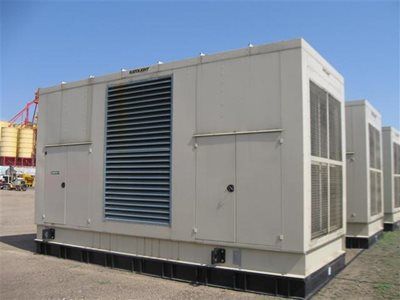
Steps retailers can take to reduce generator noise
By: Retail Brief Africa
April 24 marks World Noise Awareness Day, and according to acoustical engineer, Ben Van Zyl from Acusolv, one of the most common sources of noise produced by South African businesses today are emergency power generators.
“Generators have been around long before loadshedding became commonplace, and no one minded when they were used for the occasional power fault. But the problem now is that with frequent loadshedding, generators are running at any given point of almost every day, and it’s presented a lot of challenges for businesses, ”says Van Zyl.
He uses the example of large retailers who lose foot traffic due to noise, and how this results in businesses suffering the loss of thousands of rands each day.
In an article by the Citizen, Johannesburg-based restaurant owner, Clint Crof, highlighted how using the generator during load shedding meant that a portion of his outside terrace could not be used, because customers would complain about the noise. “ I lose about 10% of my seating area when I run the generator, but I pay rent for every square metre,” the article quoted.
External environmental noise is regulated by National and Provincial Noise Regulations implemented through noise impact assessments. In the instance of loadshedding, the noise impact depends on the proximity of the source and on the sensitivity of the neighbourhood, i.e. the zoning of the area.
“Generator noise disturbance is well regulated, but compliance by businesses still remains tricky for many. There are various measures companies can take to reduce the noise level of their generator, but they can be costly, so we do see businesses taking a lot of shortcuts while hoping for the best,” says Van Zyl.
According to test and measurement specialist, Elton Murison from TANDM, an effective way to get around generator noise is to plan for it upfront.
“There are various ways to assess the acoustics of a building so that you can find the optimal location to install your generator. Getting this right initially can save costs down the line and help keep companies compliant. There’s also advancing technology that makes the process quick and easy, like wireless sound level monitoring devices that can be hooked up to your smartphone.”
Most generators range between 70 decibels (dB) and 100 dB of noise, and there are several parameters that determine whether generator noise is excessive or not. This includes the size of the generator and its power rating, as well as the acoustical nature of the affected area, which will influence what the threshold is.
Office buildings, residential apartments, large retail sites, and lifestyle centres fall within different noise zones and what’s considered an acceptable level of noise.
One of the biggest challenges for businesses says Van Zyl, is when a business is bordered by located or near a residential zone.
“Unfortunately, the regulations are not very consistent. National Noise Regulations allow for the intrusive noise to elevate the background level 7dB, above which a noise is deemed to be a disturbance. Gauteng regulations allow only 3 dB increase,” he says.
If your business’s generator noise exceeds what’s acceptable in the specific zone, Van Zyl says there are some things you can do, depending on the amount of reduction required, the available space and other practical constraints.
Erect a partial or full screen – depending on the type of generator, it might suffice to put up a partial screen that can act as a noise barrier. These are usually made up of acoustic panels
Install a noise attenuator or additional silencers – generator noise comes from the engine, the exhaust, and the fan, with most of the sound coming from the end where the fan is. Fit attenuators on both ends to reduce the noise
Install a noise enclosure – Noise enclosures usually consist of acoustically lined steel boxes with sound attenuators fitted on the cooling vents. In some cases an enclosure may not be enough, in which case the generator has to be placed in a soundproofed plantroom.
Move the unit to another location – in less common instances, it may come down to moving the generator unit altogether. Call in the sound measurement specialists to assess which area is best suited to house the generator
Think before you buy – if it comes down to buying a new generator altogether, look carefully at the type of generator you want to purchase. Asses if it comes with a cover or it can fit in an enclosed area
News Category
- International retailers
- On the move
- Awards and achievements
- Legislation
- Wine and liquor
- Africa
- Going green
- Supplier news
- Research tools
- Retailer trading results
- Supply chain
- Innovation and technology
- Economic factors
- Crime and security
- Store Openings
- Marketing and Promotions
- Social Responsibility
- Brand Press Office
Related Articles

Shoprite and Checkers opens doors for community...

Say goodbye to Eskom as you know it

What Shell leaving South Africa means for its p...

Retailers, producers of canned pilchards cushio...


